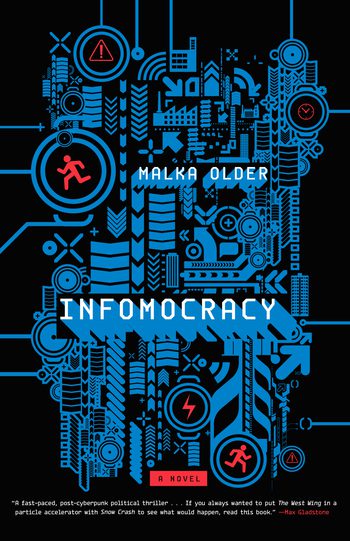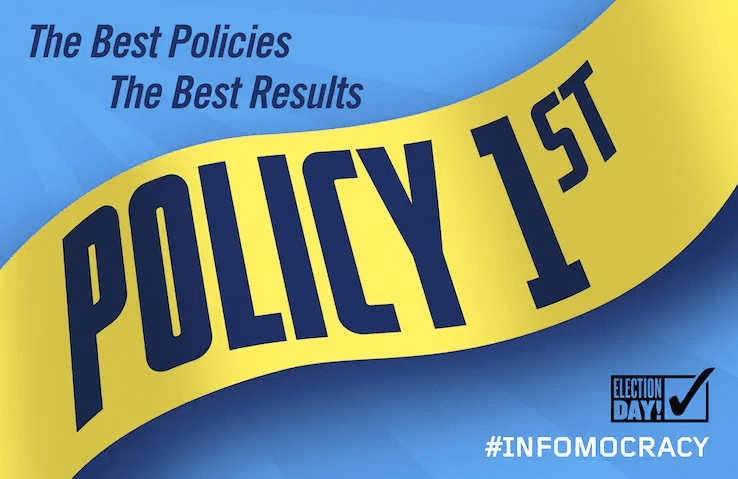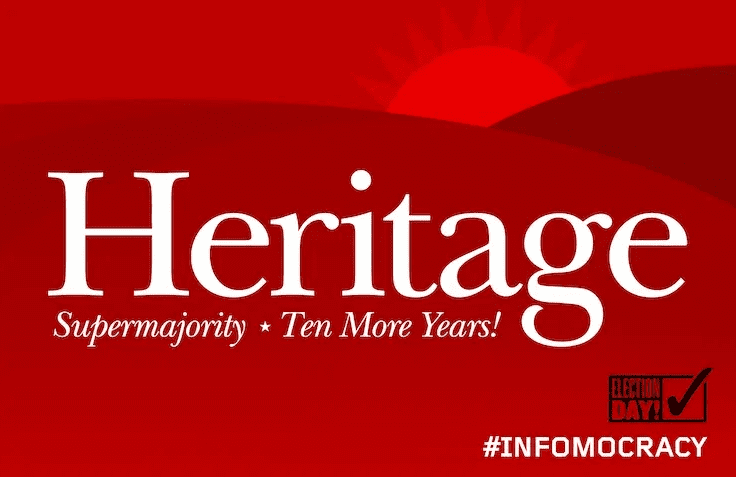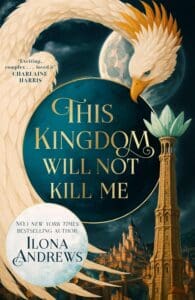
Synopsis
It’s been twenty years and two election cycles since Information, a powerful search engine monopoly, pioneered the switch from warring nation-states to global microdemocracy. The corporate coalition party Heritage has won the last two elections. With another election on the horizon, the Supermajority is in tight contention, and everything’s on the line.
With power comes corruption. For Ken, this is his chance to do right by the idealistic Policy1st party and get a steady job in the big leagues. For Domaine, the election represents another staging ground in his ongoing struggle against the pax democratica. For Mishima, a dangerous Information operative, the whole situation is a puzzle: how do you keep the wheels running on the biggest political experiment of all time, when so many have so much to gain? All three begin to realise that not everyone plans to play fair at the next election. The Liberty party is ascending on the back of subtle promises of warfare, and Heritage will do anything to keep itself in power. A perfect storm is brewing, one that might bring the new world order to its knees.
Review
Big data, ideology and international politics go awry in this globe-spanning, post-cyberpunk thriller.
It’s rare that I get fully engrossed in a fictional political narrative anymore. Sure, the vast number of Tom Clancy novels and movies deliver compelling, high-octane thrill rides, and The Manchurian Candidate (both the 1959 novel as well as the 1962 and 2004 films) still stands as one of the best election stories out there. But, when it comes down to it, the real world of politics (in the United States and elsewhere) is already rife with enough drama, deceit and decadence. Sometimes it’s just so damn tiring—and all of this coming from me, a genuine political junky. (On top of it all, most political stories just aren’t that good.)
So, it came as a wonderful surprise when I read Malka Older’s debut novel, Infomocracy, that I found myself invested in a story so distinctly political again. This book checked several boxes for me that I felt inclined to at least give it a try: experimental political systems, check; a global election run by a monopolistic search engine, check; a post-cyberpunk aesthetic and futuristic technology, check. All that was left was to crack open the pages and see where it took me. But for some reason I was hesitant, and I put off reading it for months. Then, something changed. The time felt right, I opened it, devoured it, bent the spine—and the result? Infomocracy has restored my faith in the modern wave of cyberpunk (or post-cyberpunk, if you prefer), weaving a fresh, intelligent narrative with great worldbuilding and convincing characters.

Let’s start with the world: Infomocracy takes place in the near-future, on the Earth we know and (hopefully) love, except that the nations and governments we are familiar with today have divided into microdemocracies called “centenals”. What is a centenal? It’s simply any geographical area containing a population of 100,000 people. (That could be a tiny section of a dense city like Tokyo or a larger spread of people across rural United States.) The 100,000 citizens of each centenal vote on their preferred political party, who then dictate the rules, regulations, taxes, imports and so on in that specific centenal. As a result, you could be in a city and wander a few blocks into a nearby centenal, only to find that it’s a vegan-oriented government—and you have a ham sandwich in your hand! (Well, shit…) This fascinating worldbuilding left my mind spinning with all the possibilities and variations centenals could bring about: ways of living, like-minded neighbors, mobility, access to work, food, entertainment and so much more. The choice of where to live and how would be within the hands of the citizens and the governments they vote into power. Or would it?
This is where Information comes into play. It wouldn’t be a good near-future story if there weren’t some kind of all-powerful corporation or system at play, and in Infomocracy Information is king. As an analog for Google and other tech giants, Information is a powerful search engine, communication platform and more that seeps into all aspects of daily life: the home, work, transportation, news consumption and media. Everything, really. It felt like a poignant, realistic extension of where we are going now, with social media and tech platforms. There is a double-edged sword nature to this possible future; it can connect and expand across the globe but at the same time divide and disconnect.
But, where Information truly dominates is during elections. Infomocracy centers around the third election of a ten-year election cycle, so the stakes are high, and Information plays a central role. It’s how the countless political parties campaign to the public, how voters communicate with each other, how news percolates and how citizens vote on election day. At first, it didn’t seem like the most exciting, narrative-propelling set up, but once things got going it was so good. I mean, how could a globe-spanning tech platform/search engine not be a good source of conflict? Systems can be hacked, elections can be tampered with, and people can be manipulated. Older plays with these themes with a deft touch, all the while keeping the momentum up with solid characters.
Enter Ken, Domaine and Mishima, the point-of-view protagonists. Each of them comes from a different background and approaches the election in such a way that they provide good contrast to one another. Ken is a goody-goody with a kind heart and a desire to make the world a better place (i.e. he’s a bit naïve) in his small-ish role for the Policy1st party. Domaine on the other hand, is an anarchist who wants to shake things up. Then there’s Mishima, a special operative for Information. As the story unfolds and their paths intertwine, each character’s motivations become clear, but Ken and Mishima are the standouts. They have opposing personalities and stations in life (and work), but they are both dedicated to what they believe in. That made them feel genuine and real, as though the election was a staging ground for progress and they could influence things in a meaningful way. Ken, meanwhile, is such a good guy that I couldn’t help but root for him, and Mishima shows off an insatiable mix of badass-ery (with many great action scenes) and internal conflict/truth-seeking. Domaine, unfortunately, felt a bit flat and underdeveloped. I got the feeling he’ll be more important later on in the Centenal Cycle series, but in Infomocracy he was ultimately a foil, representing the basics of the anarchist viewpoint and not much else.

Regardless, Ken and Mishima are what kept me invested throughout the book, their actions broadening the scope of the world and how the puzzle pieces fit together. The side characters they interacted with throughout were also well presented and full of personality. It was pretty darn satisfying, and for me that was one of the highlights of this book: how believable characters found themselves on a trajectory that made sense within the world, and subsequently gave the world context in relation to them as people—essentially, character-plot-worldbuilding symbiosis at its best.
Hypothetical futures are always a pleasure for me in the realm of science fiction, but Older’s near-future imagining here felt, well, totally possible. Not everything worked perfectly, of course—there was some clunky dialogue, info-dumping here and there, and the lack of development for Domaine. But overall, the characters, pacing, technology, political nuances and more came together in an honest reflection of our present day societies, cultures and governments. I loved that. It made me think of how we live today, and how we could live tomorrow.
And that’s what impressed me most—how Older uses this literary medium to imagine a distinct, experimental potential for the future of politics and people, and making it feel human. At the same time, she reimagines so many tropes of the cyberpunk genre, one that Infomocracy pays homage to but isn’t constrained by. Of course, the book is full of drastic changes in the social and political order (these are constantly shifting microdemocracies after all), as well as hacker-esque misfits, badass spy-like operatives, shady corporations and more. Yet cyberpunk is no longer relegated to cynical, neon-soaked dystopias and brooding, radical hackers. Yes, humans are still flawed, as are the systems we create. But if Older is representative of a new wave for the genre, then it is one of optimism, collaboration and a fight for access to the technologies, information and opportunities that will propel us into the future—whatever form that future may take.
Infomocracy is the first book in Malka Older’s Centenal Cycle. Find out more about the trilogy here.









[…] [Link to full review] Black Sun (Between Earth and Sky, #1) by Roanhorse, RebeccaThe pre-Columbian civilizations of the Americas serve as an inspiration for this spectacular and captivating story full of seafaring, political intrigue, magic and world-altering prophecies. The characters in this one are also some of the best in recent memory. [Link to full review] Titan’s Day & Titan Song (The Carter Archives, #2-3) by Stout, DanTitanshade, book one in The Carter Archives, was one of my favorite books last year. Its two sequels, Titan’s Day and Titan Song, surpased that one in quality and scope and solidified this as one of my favorite series. Taking influences from the noir and detective classics and bringing them into a secondary fantasy world full of strange races, rich history and a grimy setting, this is a series worth investing in. […]